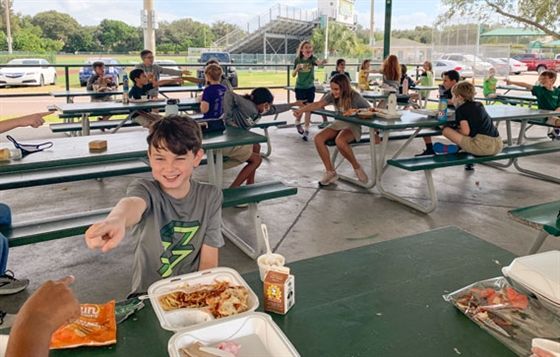

Always Have an Alibi
Source/Author: Nancy L. Spencer, Head of School
November 06, 2020
I was sitting outside Charger Commons during the Middle School lunch period. All around me were tables of three. These triads were made up of fifth graders, eating pizza, grilled cheese, salads and some very good-looking homemade potato chips. I couldn’t exactly hear what the conversation was at the tables next to me, as much as I tried to listen, but every few seconds a few of the students would raise their hands, clearly in response to a question that had been posed by someone else. There didn’t seem to any rhyme or reason to the group that was raising their hands.
At first, I thought they were raising their hands to seek permission from the teacher who was supervising them, to go back inside Charger Commons to get more food, or to get up and put their trash into the bins located nearby. But that wasn’t it, as I noticed some students, without raising their hands, seamlessly getting up, (while putting on their masks of course) and casually strolling over to the trash bin or into the building to get dessert.
What was going on? Were they voting on something? Taking a poll of who likes chicken nuggets? What was their favorite baseball team? Who was going to play soccer or basketball this winter?
I finally broke down and asked, “What are you doing?” It turned out they were playing a game called Alibi, which they learned during their Community Time and Circle of Power and Respect (CPR). Each morning the Middle School advisories meet for CPR, and twice per week they meet for Community Time. These times are when the grade levels or the Middle School as a whole work on our Core Values. Examples of topics are teamwork, goal setting, and various other lessons to help the students navigate Middle School.
In a recent CPR, the game Alibi was introduced to some fifth graders. In Alibi, one person is chosen to be the Detective. When the person is out of the room, a leader chooses one person to be the Perpetrator of the mishap and decides what the mishap is to be. Everyone has to think of an alibi for where they were when the mishap or crime took place. (E.g., The trash can was knocked over. The person was seen eating an éclair in an art museum.)
When the Detective returns, the leader tells him or her what crime has occurred. The Detective then asks each person for their alibi, "Where were you at the time of the crime?" Each person raises their hand and gives an alibi while the detective listens carefully. Every player must give the exact same alibi as before except for the student who has been chosen as the guilty person. The guilty person changes their alibi slightly. For example, the first time the guilty person says, "I went to the park." The second time the guilty person says, "I went to the pool." The Detective gets three chances to guess the identity of the criminal. Afterward, a new Detective is chosen.
This game teaches precision, concentration, and memory. It encourages students to be aware of non-verbal cues and requires careful listening skills, as players have to keep their alibis exactly the same, unless they are the Perpetrator. The group has to work together to decide who will be the leader of each game, and who gets to choose the Detective and the Perpetrator.
I was watching a version of this game unfold over lunch. It was a reminder to me of how much our students learn, both inside and outside of the classroom, and how much they enjoy their connection to each other. Watching these fifth graders erupt into giggles, I quietly finished my salad and smiled along with them.
All the best,
Nancy
At first, I thought they were raising their hands to seek permission from the teacher who was supervising them, to go back inside Charger Commons to get more food, or to get up and put their trash into the bins located nearby. But that wasn’t it, as I noticed some students, without raising their hands, seamlessly getting up, (while putting on their masks of course) and casually strolling over to the trash bin or into the building to get dessert.
What was going on? Were they voting on something? Taking a poll of who likes chicken nuggets? What was their favorite baseball team? Who was going to play soccer or basketball this winter?
I finally broke down and asked, “What are you doing?” It turned out they were playing a game called Alibi, which they learned during their Community Time and Circle of Power and Respect (CPR). Each morning the Middle School advisories meet for CPR, and twice per week they meet for Community Time. These times are when the grade levels or the Middle School as a whole work on our Core Values. Examples of topics are teamwork, goal setting, and various other lessons to help the students navigate Middle School.
In a recent CPR, the game Alibi was introduced to some fifth graders. In Alibi, one person is chosen to be the Detective. When the person is out of the room, a leader chooses one person to be the Perpetrator of the mishap and decides what the mishap is to be. Everyone has to think of an alibi for where they were when the mishap or crime took place. (E.g., The trash can was knocked over. The person was seen eating an éclair in an art museum.)
When the Detective returns, the leader tells him or her what crime has occurred. The Detective then asks each person for their alibi, "Where were you at the time of the crime?" Each person raises their hand and gives an alibi while the detective listens carefully. Every player must give the exact same alibi as before except for the student who has been chosen as the guilty person. The guilty person changes their alibi slightly. For example, the first time the guilty person says, "I went to the park." The second time the guilty person says, "I went to the pool." The Detective gets three chances to guess the identity of the criminal. Afterward, a new Detective is chosen.
This game teaches precision, concentration, and memory. It encourages students to be aware of non-verbal cues and requires careful listening skills, as players have to keep their alibis exactly the same, unless they are the Perpetrator. The group has to work together to decide who will be the leader of each game, and who gets to choose the Detective and the Perpetrator.
I was watching a version of this game unfold over lunch. It was a reminder to me of how much our students learn, both inside and outside of the classroom, and how much they enjoy their connection to each other. Watching these fifth graders erupt into giggles, I quietly finished my salad and smiled along with them.
All the best,
Nancy
























